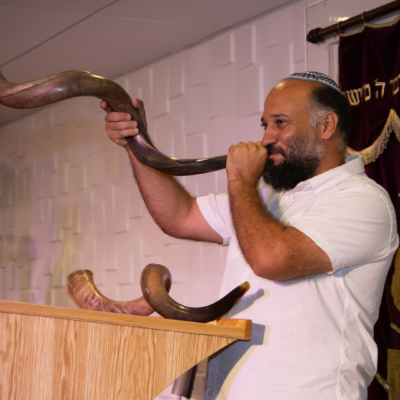The Festival of Tabernacles (Sukkot) is unique among the biblical holidays in that God commands us three times to be joyful before Him during this holiday.
Two times in Deuteronomy 16:13-15:
“You shall observe the Feast of Tabernacles seven days… And you shall rejoice in your feast…Lord your God will bless you in all your produce and in all the work of your hands, so that you surely rejoice.
And also in Leviticus 23:33-40:
…and you shall take for yourselves on the first day the fruit of beautiful trees, branches of palm trees, the boughs of leafy trees, and willows of the brook; and you shall rejoice before the Lord your God for seven days.
The Feast of Tabernacles is unique in its insistence that we be joyful during this holiday. We are commanded once to be joyful during the Festival of Weeks (Pentecost). What about the other biblical holidays?
Passover, the Day of Atonement and the Day of Trumpeting: Serious and Solemn
Passover and the Day of Trumpeting speak about suffering and trials, albeit suffering and tribulation through which come salvation and redemption. It is difficult to be joyful through suffering and trials, like a woman in labor; no woman is joyful when experiencing painful contractions. But when the baby is born, there is then great joy! In the same way, Passover points to the sacrifice of the Messiah, the terrible suffering of God on our behalf, to redeem us and bring us from death to life. The Day of Trumpeting (Yom Tru’ah) points to the days of tribulation in the end times before the Lord returns, to God’s judgements during that time and to Jacob’s trouble during that time from which he will be saved.
The Day of Atonement is a solemn day of “afflicting our souls” and repentance. Prophetically, it points to the period during the great tribulation called Jacob’s Trouble when the people of Israel will cry out to God for mercy in repentance and mourning and will receive a collective revelation of Yeshua the Messiah, “the One they have pierced”. (Zechariah 12:10)
The Festival of Weeks\ First Fruits (Shavuot\Bikkurim) – Joy!
The Torah (Genesis to Deuteronomy) commands us to be joyful on the biblical festival of Weeks\First Fruits which is firstly an agricultural holiday: on this holiday the first fruits of the early harvest were brought into the Holy Temple. It was on this holiday in the New Testament when the first Jewish believers were gathered in Jerusalem that the Holy Spirit fell on them, revealing to us this holiday’s prophetic meaning. So the Festival of Weeks is a joyful agricultural celebration, a celebration of the joy of the Holy Spirit and the First Fruits of the gospel which went forth unto the nations after the outpouring of the Holy Spirit.

Tabernacles\Ingathering (Sukkot\Aseef) – A Much Greater Joy!
Three times the Torah commands us to be joyful before the Lord on this festival. Like the Festival of Weeks, Tabernacles is an agricultural holiday called Ingathering:
“Celebrate the Festival of Harvest (Weeks) with the firstfruits of the crops you sow in your field. Celebrate the Festival of Ingathering (Sukkot) at the end of the year, when you gather in your crops from the field.” ~Exodus 23:16
If the Festival of Weeks prophetically pointed to the firstfruits of the gospel, then the Festival of Tabernacles points to the final harvest when God the Father says to the angels in heaven, “Gather the wheat into my barns!” However, this holiday is not only pointing to the great and final harvest. Tabernacles points to the greatest joy imaginable in this creation: the beginning of the Messianic Kingdom here on earth, the redemption of all creation and a return of all things to their proper place under the rule of Yeshua the Messiah here on earth.

The Thousand-Year Messianic Kingdom
Revelation 20:1-6, Isaiah 11:1-10
When Yeshua returns at the end of the great tribulation and destroys the Antichrist and all his armies, He will then rule and reign here on earth for a thousand years, together with resurrected believers who “shall be priests of God and of the Messiah, and shall reign with Him a thousand years.” (Rev. 20:6) What will this kingdom be like? The prophet Isaiah gives us a detailed picture in chapter 11 which shows the King Messiah ruling the nations in justice, wisdom and the knowledge of God. It is interesting to note how the prophet Isaiah describes the King Messiah as the “Root of Jesse”, that is, the source of the Davidic lineage as God His creator, and as “a branch…from the stump of Jesse”, that is Yeshua as a man directly descended from the Davidic lineage.
Tabernacles – The Greatest Joy Imaginable
The greatest joy that we can know is Yeshua reigning and ruling over the earth in justice, truth and love, filling the earth with peace and the knowledge of the LORD. During this thousand-year Messianic kingdom, the prophet Isaiah describes creation being restored to its proper order, in Edenic peace and innocence, with all people living how God intended: under the kingship of His Son, in justice, peace, and the knowledge of God.
This is such a great and profound joy, all nations will continue to celebrate the Feast of Tabernacles in the Messiah’s kingdom:
“Then the survivors from all the nations that have attacked Jerusalem will go up year after year to worship the King, the Lord Almighty, and to celebrate the Festival of Tabernacles.” ~Zechariah 14:16
But God is inviting us to participate in that joy now, ahead of time, during the Feast of Tabernacles, to look ahead with joy and anticipation to that amazing time when the Tabernacle of God will be with us here on earth. This is the greatest joy conceivable to us in this world – Yeshua the Messiah, here on earth, ruling and reigning with His cherished Bride, the redeemed believers, and seeing the earth and all its peoples filled with the knowledge of the Lord: this joy is every heart’s deep desire to return to the beauty and innocence of the Garden of Eden and man and woman’s intimate communion with God.






Felishia Freddy says:
Love to hear from you
We are from Horeb the biblical Hebrew school in India